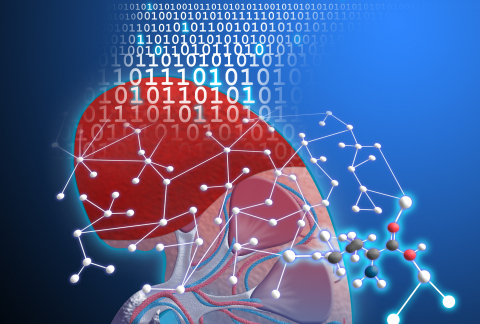Leading NMR diagnostics company numares recently published data showing that its novel, multi-marker approach to assess kidney function allowed for a more precise estimation of glomerular filtration rate (GFR) by a simple serum test. Named GFRNMR, the test provided metabolic characterization of renal dysfunction, by evaluating a group of metabolites. This “metabolite constellation” was comprised of myo-inositol, dimethylsulfone, valine, and creatinine, independently from age and sex. The test holds the potential for an improved assessment of kidney function, and deeper insights into kidney pathophysiology.
This press release features multimedia. View the full release here: https://www.businesswire.com/news/home/20210225005061/en/

numares uses “metabolite constellations”: a set of combined metabolic biomarkers evaluated by AI, to assess kidney function with serum-based GFRNMR test. (Graphic: Business Wire)
In this proof-of-concept study, published in the peer-reviewed journal Diagnostics1, numares showed that a combination of multiple renal biomarkers, all with pathophysiological relevance, may overcome the diagnostic limitations of existing methods used to estimate GFR. This is a measure of kidney function used for assessment of metabolic renal dysfunction associated with chronic kidney disease.2
GFRNMR is based on numares’ metabolomics approach: a combination of multiple metabolites, forming a metabolite constellation, analyzed by advanced nuclear magnetic resonance (NMR) spectroscopy and evaluated by numares’ proprietary, AI-driven AXINON® diagnostic software. Following a targeted metabolomics approach, numares identified and combined the metabolites myo-inositol, dimethylsulfone, valine, and creatinine into a unique metabolite constellation, developing an algorithm which enables improved assessment of kidney function by a simple serum test.
The multi-marker algorithm was trained with 95 bio-banked serum samples and tested in 189 independent samples originated from Lyon/France, Gothenburg/Sweden, and Berlin/ Germany. The results were compelling: GFRNMR correlated better with measured GFR. Overall percentages of GFRNMR values matched, or more frequently exceeded those for commonly used, recommended eGFR equations.
“The outcome of this proof of concept surpassed equations used to estimate GFR which are recommended by KDIGO and commonly used to assess kidney function,” says Winton Gibbons, President – US and co-Chief Executive Officer of numares. “Subsequent to this proof of concept, we have been able to further refine our metabolite-based modeling, using a much broader set of samples. This newer model resulted in yet more promising data in a US-based validation study. In total, the GFRNMR approach is now validated in clinical studies with ~1,500 patient samples, and numares plans to submit the GFRNMR test for FDA Clearance in the first half 2021.“
1 Full article: Ehrich, J., et al., Serum myo-inositol, dimethyl sulfone, and valine in combination with creatinine allow accurate assessment of renal insufficiency. Diagnostics 2021, 11(2), 234; available at https://www.mdpi.com/2075-4418/11/2/234/htm
2 Current diagnostics in kidney function assessment:
Fifteen percent of U.S. adults (37 million people) are estimated to have chronic kidney disease (CKD)*. Evaluation of renal dysfunction includes estimation of glomerular filtration rate (eGFR) as the initial step and subsequent laboratory testing. Existing methods for eGFR with endogenous markers still present important drawbacks. As a result several eGFR equations have been developed but were commonly found to be insufficient to assess patients’ complex renal dysfunction and complications according to the stages of CKD.
* Source: https://www.cdc.gov/kidneydisease/publications-resources/2019-national-facts.html
About numares
numares AG, based in Regensburg, Germany, is a fast-growing innovative diagnostics company that applies machine learning to metabolomics data to develop advanced analytical tests for high-throughput use in clinical diagnostics. The AXINON® System employs advanced nuclear magnetic resonance (NMR) spectroscopy to evaluate metabolic constellations. Magnetic Group Signaling (MGS®) is a proprietary technology that enables NMR for highly standardized and rapid throughput testing. Metabolic tests stand as an important pillar in precision medicine to address unmet needs in cardiovascular, kidney, liver, and neurological diseases. You will find more information at https://www.numares.com/
View source version on businesswire.com: https://www.businesswire.com/news/home/20210225005061/en/
For further information please contact:
numares
Christiane Proll
Tel.: +49 941 280 949-14
E-Mail: christiane.proll@numares.com
Permalink: http://www.businesswire.com/news/home/20210225005061/en








